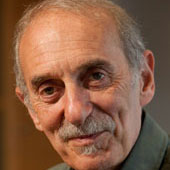The Pyrrhic Victory of Secular Capitalism
What effect have the rise of “secular capitalism” and globalization had on people’s religious beliefs?
December 1, 2008
The fall of the Berlin Wall in 1989 defined not only the end of the Cold War but much else besides. America, as a modern, secular democracy, “won” in so far as it remained the world’s sole superpower.
Capitalism “won” to the extent that the way was then clear for the further advance of unfettered globalization with the entry of billions of people into the global market economy.
It was believed widely — and still is by some — that economic success would advance the spread of secularism and act as an agent of change to lessen the influence of religious belief.
In effect, the powerful drivers of growth, technology and globalization would reduce economic and social problems to the management of incremental improvement and progress, consigning spiritual and existential issues to the periphery.
Neither of these victories, so to speak, ushered in a new era for secular capitalism, and the religious-secular pendulum has at the very least faltered in its swing towards the secular.
Almost 20 years after the fall of the Wall, insecurity and injustice — perceived or actual — are rampant.
The pursuit of wealth and the acquisition of material goods haven’t become sources of comfort and satisfaction for individuals any more than our version of globalization has become the template for unqualified global economic success.
Although mass religious protests against unfettered globalization and the secular West have been common in many developing countries for a long time, it is in the West that such incidents have become more common in the last 20 years. Christian fundamentalism is not new, but was a small and insignificant force for much of the period from the 1920s to the 1980s.
Since then there has been a resurgence, and, in recent years, Christian fundamentalists have organized demonstrations to protest the burden of Third World debt, the continuing famine and strife in Sudan, the spread of AIDS, abortion, international sex trafficking, and gay rights.
Some religious protests have surprised or even shocked secular societies, none more so perhaps than the mass demonstrations organized by Islamic groups in Western cities and around the Islamic world to protest the publication of cartoons depicting the Prophet Mohammed in a Danish newspaper in 2005.
While these examples demonstrate the mobilization by megaphone of religious feeling, they differ from the more private adherence and respect for religious belief in which people may still mobilize — but as self-consciously religious individuals.
The former is obviously a way of mobilizing people behind a cause, or to pursue specific goals, while the latter is a more subtle, almost passive form of mobilization of people, united in their belief and conviction systems.
Abortion, a hot issue in the United States, is illustrative of this. Many people might be driven via political and religious organizations and rallies to campaign against abortion. But many may object and empathize in a different way, resulting from personal experiences that change their overall belief systems about social and moral matters.
The main point is that — in both richer and poorer countries — more people seem to be looking to their version of God for the meaning and essential rules of life and for ways of addressing discontentment, injustice, or disadvantage.
Secular capitalism and laissez-faire globalization, then, have not calmed the sometimes turbulent waters between secular and religious society.
On the contrary, secular capitalism has not brought with it the abandonment of bigotry and violence, and it has not encouraged people to abandon religious belief in the search for meaning and emotional security.
If the world today provides fertile ground for religious alternatives to take root, the significance of demographic change — including populations aging — becomes greater.
This is for three reasons: the association of higher levels of religious belief with people who have lots of children, the links between stronger religious belief and age, and the tendency for people to pass on their religious beliefs to their children.
Editor’s Note: This feature is adapted from “The Age of Aging,” by George Magnus. Reprinted by arrangement with John Wiley and Sons. Copyright (c) 2008 by George Magnus. All rights reserved.
Takeaways
Secular capitalism has not brought with it the abandonment of bigotry and violence, and it has not encouraged people to abandon religious belief .
It was believed widely — and still is by some — the economic success would advance the spread of secularism and act as an agent of change to lessen the influence of religious belief.
Almost 20 years after the fall of the Wall, insecurity and injustice — perceived or actual — are rampant.
The pursuit of wealth and the acquisition of material goods haven't become sources of comfort and satisfaction for individuals.
Read previous
Out of Bretton Woods
November 26, 2008
